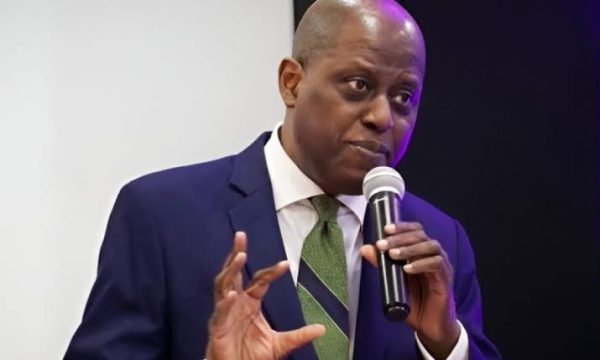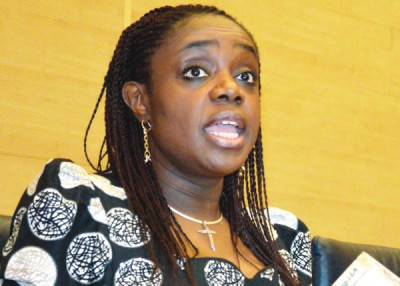Govt Under Pressure To Stop Cybersecurity Levy

The House of Representatives, Northern Elders Forum and some members of the Organised Private sector on Thursday asked the CBN to suspend the implementation of the controversial cybersecurity levy, saying the new charge would worsen the economic hardship in the country, among other issues.
Specifically, they called for a complete reversal of the policy, which they described as insensitive.
The cybersecurity levy, meant to be imposed on online banking transactions, had earlier been rejected by many Nigerians.
On May 6, the CBN communicated a new policy requiring financial institutions to introduce the cybersecurity levy.
The CBN said the levy pegged at 0.5 per cent of all electronic transaction values is a provision of the recently passed 2024 Cybercrime (Prohibition, Prevention, etc.) Amendment Act.
The purpose of this levy, according to the bank, is to bolster the nation’s cybersecurity initiatives, which are overseen by the Office of the National Security Adviser.
Through a circular addressed to banks, the CBN mandated financial institutions to commence the imposition of the cybersecurity levy.
The circular, endorsed by the CBN’s Director of Payments Systems Management, Chibuzor Efobi, and the Director of Financial Policy and Regulation, Haruna Mustafa, clarified that the new surcharge collection was in response to the enactment of the 2024 Cybercrime (Prohibition, Prevention, etc.) Amendment Act.
However, prominent Nigerian groups including the Reps and NEF urged the apex bank to withdraw the “ambiguous” circular in existence and issue an unequivocal circular in line with the letters and spirit of the Cybercrimes (Amendment) Act, 2024.
The House also directed its committees on Banking Regulations, and Banking and Other Ancillary Institutions to guide the CBN properly.
The resolution followed the adoption of a motion of urgent public importance moved by the House Minority Leader, Kingsley Chinda and 359 others.
Moving the motion, Chinda who represents the Obio/Akpor Federal Constituency, Rivers State, noted that the CBN through a circular to all commercial, merchant, non-interest and payment service banks; other financial institutions, mobile money operators and payment service providers (“CBN Circular”) dated May 6, 2024, informed Nigerians of a proposed 0.5 per cent levy on electronic transactions in line with Section 44(2) (a) of the Cybercrimes (Amendment) Act, 2024.
He maintained that Section 44(2)(a) of the Cybercrimes (Prohibition, Prevention, etc) (Amendment) Act, 2024 provides that “A levy of 0.5 per cent (0.005) equivalent to half per cent of all electronic transactions value by businesses specified in the Second Schedule to the Act” be paid into the Cybersecurity Fund.”
He explained, “The House notes that businesses which the said Section 44(2)(a) refers to are listed in the Second Schedule to the Cybercrimes Act to be GSM Service Providers and all telecommunication companies; Internet Service Providers; Banks and Other Financial Institutions; Insurance Companies and the Nigerian Stock Exchange.
“The CBN circular mandates all banks, other financial institutions and payments service providers to implement the Cybercrimes Act by applying the levy at the point of electronic transfer origination as ‘cybersecurity Levy’ and remitting same.
“The wordings of the CBN circular leaves the directive to multiple interpretations including that the levy be paid by bank customers, that is, Nigerians against the letters and spirit of Section 44(2)(a) and the Second Schedule to the Cybercrimes Act, which specifies the businesses that should be levied accordingly.”
The development according to the lawmaker, “has led to apprehension as civil society organisations and citizens have taken to conventional and social media to call out the Federal Government, give ultimatums for a reversal of the imposed levy on Nigerians among other things.
He argued that unless immediate pragmatic steps were taken to stop the proposed action of the CBN, “The Cybercrime Act shall be implemented in error at a time when Nigerians are experiencing the aftermath of multiple removal of subsidies from petroleum, electricity and so on and the rising inflation.”
Northern elders kick
Reacting, the Prof. Ango Abdullahi-led Northern Elders Forum, on Thursday, condemned the CBN’s decision to impose a cybersecurity levy on bank customers across the country.
The NEF, through a statement by its Director of Publicity and Advocacy, Abdul-Azeez Suleiman, expressed dissatisfaction with the policy.
The forum cited the escalating costs associated with banking transactions as a result of multiple charges, describing the CBN’s new directive as “arbitrary, illegal, and out of touch with the realities faced by Nigerians.”
The northern body, therefore, called on the government to reconsider the policy and explore alternative measures to ease the financial strain on individuals while still promoting the use of electronic payments.
The NEF pointed out that the introduction of cybersecurity levies, in addition to existing fees such as stamp duty, transfer fees, value-added tax, and SMS charges, has placed an unbearable financial burden on individuals engaging in electronic transactions.
The forum highlighted the various charges that bank customers now face, including cybersecurity levy, transfer fees, stamp duty, and Value-Added Tax, saying the additional costs had significantly increased the overall expense of electronic transactions for both senders and receivers.
While acknowledging the importance of cybersecurity in safeguarding electronic transactions, the NEF emphasised the need for a more balanced approach that ensures the costs of security measures are reasonable and do not excessively burden bank customers.
The NEF said that in a country already grappling with economic challenges and hyper-inflammatory conditions, the additional financial burden imposed by the cybersecurity levy was unjust and unfair, urging the government and relevant stakeholders to find a sustainable solution that strikes a fair balance between enhancing cybersecurity and alleviating the financial strain of the Nigerian populace.
“It is crucial that the government listens to the concerns of organisations like the NEF and works towards implementing policies that benefit all Nigerians, rather than burdening them with additional costs and hardships.
“It is essential to strike a delicate balance between enhancing cybersecurity and easing the financial burden on the populace, particularly at a time when the Nigerian economy is facing significant challenges due to inflation and other economic factors,” the NEF said.
The elders urged the authorities and relevant stakeholders to engage in meaningful review and find a solution that addresses the legitimate concerns raised by the public regarding the cybersecurity levy.
In the same vein, the Lagos Chamber of Commerce and the Centre for the Promotion of Private Enterprise also demanded the stoppage of the cybersecurity levy.
The private sector advocacy groups, in separate statements, condemned the move by the government to introduce a new levy at a time Nigerians were grappling with ‘severe economic hardship’.
In a statement signed by its Director-General, Chinyere Almona, the LCCI described the levy as worrisome, stating that individuals and businesses would be burdened with an additional levy amid unsettled performance crises with power supply after the recently reviewed electricity tariffs.
The chamber noted that the upward review of the electricity tariff had not resulted in a commensurate boost in power supply to justify the additional costs to individuals and businesses.
The LCCI further argued that since the collection of the levy cannot guarantee the protection of payers from cyberattacks, it was difficult to justify its collection at this time.







